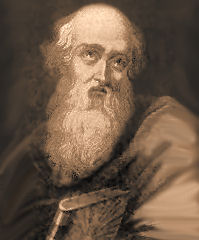On Idolatry
Every Christian should know that idolatry is forbidden in Scripture, both in the Old and the New Testaments.
The first of the ten commandments reads: Exodus 20:2–6 (ESV) 2 “I am the Lord your God, who brought you out of the land of Egypt, out of the house of slavery. 3 “You shall have no other gods before me. 4 “You shall not make for yourself a carved image, or any likeness of anything that is in heaven above, or that is in the earth beneath, or that is in the water under the earth. 5 You shall not bow down to them or serve them, for I the Lord your God am a jealous God, visiting the iniquity of the fathers on the children to the third and the fourth generation of those who hate me, 6 but showing steadfast love to thousands of those who love me and keep my commandments.
The New Testament is unambiguous: 2 Corinthians 6:16 (ESV) 16 What agreement has the temple of God with idols? For we are the temple of the living God; as God said, “I will make my dwelling among them and walk among them, and I will be their God, and they shall be my people.
Idolatry is identified as a “work of the flesh” that will exclude those who practise it from the Kingdom of God:
Galatians 5:19–21 (ESV) 19 Now the works of the flesh are evident: sexual immorality, impurity, sensuality, 20 idolatry, sorcery, enmity, strife, jealousy, fits of anger, rivalries, dissensions, divisions, 21 envy, drunkenness, orgies, and things like these. I warn you, as I warned you before, that those who do such things will not inherit the kingdom of God.
Most Christians understand that idolatry stands opposed to everything that God expects.
But there are other attributes to idolatry that need to be understood by Christians and failing to grasp these things can make idolatry into a less-than-real threat, a theory so to speak. I suggest these points:
1. Idols are always a lie. Now what is valued by an individual or a society is not necessarily a lie, but when it is elevated to an object of worship, it is a lie. Take for example wealth: wealth is a good thing, and it is not an evil thing to gain wealth, manage it, and exercise stewardship over it. But understood in its proper place, wealth is insufficient as a deity. It is a falsehood to consider wealth as the total purpose of life. Wealth as an idol is a rejection of God (Matthew 6:24). The modern State claims absolute authority over the family and the church. This too is a lie.
2. Idols are always polytheistic. There are many gods of idolatry, whereas the Triune God of Scripture is One in three Persons. The God of the Bible is perfect in unity and purpose.
Because of the limited nature of an idol, its insufficiency to fulfill the role of deity, there must be many idols. So there are idols of power, human autonomy, individualism, collectivism, knowledge, science, culture—the list can go on and be very long.
Only the Triune God can explain and fulfill the role of absolute truth, beauty, love, holiness. All idols are inadequate caricatures.
3. Idols are absolute, which is contradictory. This point is made clear by the fact that each idol claims absolute authority, but these absolutes contradict and conflict with one another: in sexual morality, complete autonomy is demanded to the point that abortion is a sacrament to the sexual revolution. On the other hand, also a product of the sexual revolution, this autonomy of the person is removed entirely by societal demand for the acceptance of sexual perversion: same-sex marriage and transgenderism. In the name of autonomy, abortion is always legal; but in the name of collectivism, taxpayers opposed to it must still fund it.
There are many examples of conflicting absolutes: since the outbreak of Covid-19, safety has taken on the role of a god, with many sacrifices demanded. The balance between individual rights and freedoms and the demand for safety has been abolished.
The State has, in these times of God’s eclipse, claimed absolute authority over the family and church. In the family, because the State claims the authority to define a family—members, number, gender. Over the church, because the church can only function within the permission of the State.
4. Idols demand sacrifice. This is clearest in the role of abortion in society, where individual autonomy is exercised over an unborn human being from conception to birth. Since Covid-19, the physically weak have been denied health care in the name of (sacrificed to) safety, the god of 2020. The residents of Long Term Care homes have been sacrificed as well, because safety is now an absolute. This, of course, contradicts even the idolatrous autonomy of the individual!
5. Idols enter into absence (Exodus 32). When a people rejects the presence of the invisible God, visible, contradictory, weak and inadequate idols are sought to replace Him.
A beginning response to idolatry is found in the first question of the Heidelberg Catechism:
What is thy only comfort in life and death?
That I with body and soul, both in life and death, am not my own, but belong unto my faithful Saviour Jesus Christ; who, with his precious blood, has fully satisfied for all my sins, and delivered me from all the power of the devil; and so preserves me that without the will of my heavenly Father, not a hair can fall from my head; yea, that all things must be subservient to my salvation, and therefore, by his Holy Spirit, He also assures me of eternal life, and makes me sincerely willing and ready, henceforth, to live unto him. –Historic Creeds and Confessions, electronic ed. (Oak Harbor: Lexham Press, 1997).
Any answer to this question that is NOT “my faithful Saviour Jesus Christ” is an idol. I believe that many Christians have fallen into idolatry this year, and that idol is safety. No sacrifice is too small: employment, the love and fellowship of a family, gathered worship, freedom of movement—all are freely given up in the name of safety.
But there is another idol, the State, that claims absolute rights, power, and authority over all of life. This is an “idolatrous absolute” that must be rejected by the Christian. It is indisputable that the State in itself knows no limits, making it a dangerous threat to the Christian.
“Flee from idolatry” (1 Corinthians 10:14). In order to do this, we must be able to identify them and act against them.
©Scott Jacobsen. All rights reserved.


